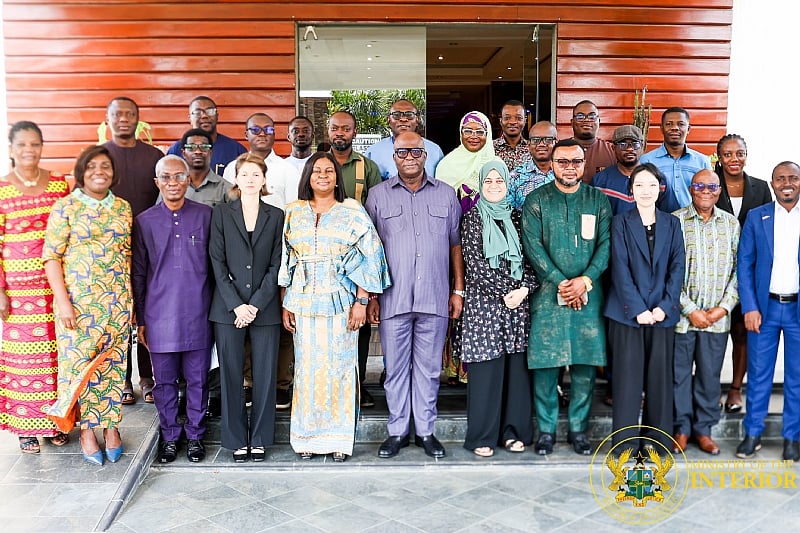The West Africa Action Network on Small Arms (WAANSA Ghana) has lauded the Ghanaian government, particularly the Ministry of the Interior, for their demonstrable commitment to the passage of the National Small Arms Bill. WAANSA Ghana emphasized the Minister and Deputy Minister’s consistent public pronouncements supporting the bill, recognizing this as a crucial step in strengthening arms control within the country. This commendation was delivered during a high-level consultative meeting held in Ada Foah, co-organized by WAANSA Ghana and the United Nations Development Programme (UNDP) under the Saving Lives Entity (SALIENT) Fund Project. The meeting served as a platform for stakeholders, including government officials, security agencies, civil society organizations, and international partners, to collaborate on enhancing Ghana’s arms governance systems and advocate for the bill’s passage.
The consultative meeting, themed “Building a Robust Arms Regulatory Framework,” underscored the importance of a comprehensive and collaborative approach to arms control. It facilitated discussions on critical aspects of the bill, including Ghana’s international obligations related to arms control, the legislative and cabinet approval processes, and the potential of integrating technology, such as digital tracking systems and databases, for more effective arms management. The meeting also provided an opportunity to analyze successful advocacy strategies used elsewhere to mobilize public and institutional support for similar legislation, aiming to replicate these successes in Ghana. The meeting served as a key element of the broader SALIENT Project, which strives to integrate arms control into national development plans, thereby fostering peace and security throughout West Africa.
WAANSA Ghana extended its appreciation to various key players contributing to this effort. Ms. Doreen Annan, the acting Chief Director of the Ministry of the Interior, was specifically acknowledged for her unwavering support and insightful contributions to the bill’s development. International partners, including the UNDP, the United Nations Office for Disarmament Affairs (UNODA), and the United Nations Office on Drugs and Crime (UNODC), were also commended for their commitment to supporting the passage of the bill and the approval of the Arms Trade Treaty Implementation Memoranda. Notably, Ghana is the third African country to benefit from the first phase of the SALIENT Trust Fund, a collaborative initiative by UNODA, UNDP, and UNODC focused on combatting armed violence and the illicit trafficking of small arms and light weapons (SALW). This project emphasizes a holistic approach to sustainable security and development, recognizing the interconnectedness of these critical areas.
The diverse group of stakeholders participating in the meeting reflects the wide-ranging impact of the National Small Arms Bill and the collaborative effort required for its successful implementation. Participants included representatives from the Ministry of the Interior, the Attorney General’s office, the Narcotics Control Board, the Ghana Boundary Commission, the Ghana Law Reform Commission, policymakers, parliamentarians, and the National Commission on Small Arms and Light Weapons (NATCOM). Civil society organizations, both national and international, were also represented, including the International Action Network on Small Arms (IANSA). Furthermore, various United Nations agencies in Ghana, namely UNDP, UNREC, UNRCO, and UNODC, participated, showcasing the international community’s support for Ghana’s efforts to strengthen its arms control framework.
The meeting served not only as a platform for discussion and strategizing but also as a testament to the growing momentum behind the bill. Participants expressed optimism that with continued advocacy, strong political will, and concerted action, the National Small Arms Bill would be swiftly passed. This achievement would position Ghana as a regional leader in arms governance and conflict prevention, setting a precedent for other countries within the sub-region. The passage of this bill is expected to significantly contribute to reducing armed violence and promoting stability and sustainable development in Ghana, making it a safer and more secure nation.
This proactive engagement by government officials, civil society organizations, and international partners demonstrates a shared commitment to addressing the complex challenges posed by the proliferation of small arms. The collaborative approach taken in developing and advocating for the National Small Arms Bill underscores the understanding that effective arms control requires a multifaceted strategy encompassing legislative reform, robust enforcement mechanisms, and international cooperation. The high-level consultative meeting in Ada Foah represents a significant milestone in this ongoing process, fostering dialogue, strengthening partnerships, and ultimately paving the way for a more secure and peaceful future for Ghana and the wider West African region.














